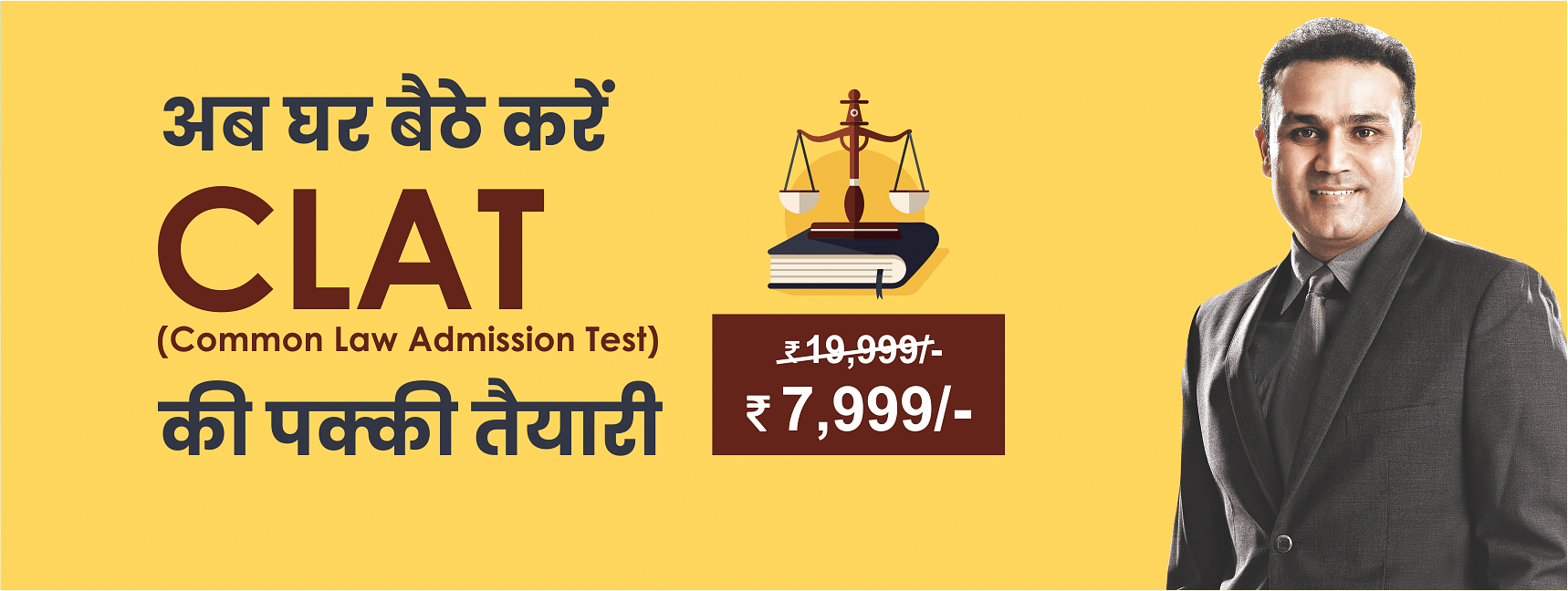CLAT (UG) - 2 Months Crash Course
Course Name:
CLAT (UG) - 2 Months Crash Course
Mode of Study
Online Live Classes
Targeted Exams
CLAT (UG) - 21st June`2020(Exam postponed due to Covid-19 lockdown. New dates will be released soon)
Eligibility
10+2, 45% marks (Any Stream)
Note: Candidates who are appearing in the qualifying examination in March/April, 2020 are also eligible to appear in CLAT 2020 examination. However, they shall be required to produce evidence of their passing the qualifying examination at the time of admission, failing which they shall lose their right to be considered for admission.
Upper Age Limit
There will be no upper age limit for UG Programme in CLAT 2020. In case of equal marks, the break of tie shall be by the following procedure and order as under:
1. Higher marks in the component/section on legal aptitude in the CLAT 2020 exam
2. Higher age
3. Computerised draw of lots.
Courses Available
CLAT (UG)
Course Duration
2 Months
Mode of instruction
Bilingual (Hindi & English)
Hours of Study
100+ hours of Live Study
Subjects Covered
English Language, Quantitative Techniques, Logical Reasoning, Current Affair with General Knowledge, Legal Reasoning
Course Start Date
1st June-2020
Class Schedule
6 Days in a week
Daily Class Timings
2 Hrs.
Session I (Subject-1) 1 hr: 12:30 pm to 1:30 pm
Session II (Subject-2) 1 hr: 2:00 pm to 3:00 pm
About Common Law Admission Test (CLAT 2020) Exam
There are a total of 22 participating national law universities which conduct the CLAT exam on a rotational basis. Approx2500UGand720PGCLATseatsare offered by the participating NLUs every year. There are a total of 53 private universities in India that accept the CLAT score for admission to UG & PG Courses. This year National University of Study And Research In Law (NUSRL), Ranchi will conduct the CLAT 2020.
Exam Pattern of the CLAT Course
Exam Mode: Objective Type Offline Mode (Pen & Paper)
Exam Pattern: CLAT (UG)
1.
English Language
28-32 questions, or roughly 20% of the paper
2.
Current Affairs, including General Knowledge
35-39 questions, or roughly 25% of the paper
2 Hrs. (120 Minutes)
3.
Logical Reasoning
28-32 questions, or roughly 20% of the paper
4.
Quantitative Techniques
13-17 questions, or roughly 10% of the paper
5.
Legal Reasoning
35-39 questions, or roughly 25% of the paper
Negative marking: 0.25 marks will be deducted if wrong answer marked.
Can I prepare for CLAT in just 2 Months?
Many students often enquire about the preparation plan for CLAT, in just 2 Months. Our experts suggest; every day 3 to 4 hours of dedicated study plan can help you prepare and crack CLAT. Right guidance and focused approach is the key to success.
As per the CLAT Site below is the Course Details:
English Language In this section of the UG-CLAT 2020, you will be provided passages of about 450 words each. These passages will be derived from contemporary or historically significant fiction and non-fiction writing, and would be of a standard that a 12th standard student may be able to read in about 5-7 minutes. Each passage will be followed by a series of questions that will require you to demonstrate your comprehension and language skills, including your abilities to:
- Read and comprehend the main point discussed in the passage, as well as any arguments and viewpoints discussed or set out in the passage;
- Draw inferences and conclusions based on the passage;
- Summarise the passage;
- Compare and contrast the different arguments or viewpoints set out in the passage; and
- Understand the meaning of various words and phrases used in the passage.
Current Affairs Including General Knowledge
In this section, you will be provided passages of up to 450 words each. The passages will be derived from news, journalistic sources and other non-fiction writing. The questions may include an examination of legal information or knowledge discussed in or related to the passage, but would not require any additional knowledge of the law beyond the passage.
Each passage will be followed by a series of questions that will require you to demonstrate your awareness of various aspects of current affairs and general knowledge, including:
- Contemporary events of significance from India and the world;
- Arts and culture;
- International affairs; and
- Historical events of continuing significance.
Legal Reasoning
In this section, you will be expected to read passages of around 450 words each. The passages may relate to fact situations or scenarios involving legal matters, public policy questions or moral philosophical enquiries. You will not require any prior knowledge of law. You will benefit from a general awareness of contemporary legal and moral issues to better apply general principles or propositions to the given fact scenarios.
Each passage would be followed by a series of questions that will require you to:
- Identify and infer the rules and principles set out in the passage;
- Apply such rules and principles to various fact situations; and
- Understand how changes to the rules or principles may alter their application to various fact situations.
Logical Reasoning
The Logical Reasoning section of the UG-CLAT 2020 will include a series of short passages of about 300 words each. Each passage will be followed by one or more questions that will require you to:
- Recognize an argument, its premises and conclusions;
- Read and identify the arguments set out in the passage;
- Critically analyse patterns of reasoning, and assess how conclusions may depend on particular premises or evidence;
- Infer what follows from the passage and apply these inferences to new situations;
- Draw relationships and analogies, identify contradictions and equivalence, and assess the effectiveness of arguments.
Quantitative Techniques
The Quantitative Techniques section of the UG-CLAT 2020 will include short sets of facts or propositions, graphs, or other textual, pictorial or diagrammatic representations of numerical information, followed by a series of questions. You will be required to derive information from such passages, graphs, or other representations, and apply mathematical operations on such information.
The questions will require you to:
- Derive, infer, and manipulate numerical information set out in such passages, graphs, or other representations; and
- Apply various 10th standard mathematical operations on such information, including from areas such as ratios and proportions, basic algebra, mensuration and statistical estimation.





